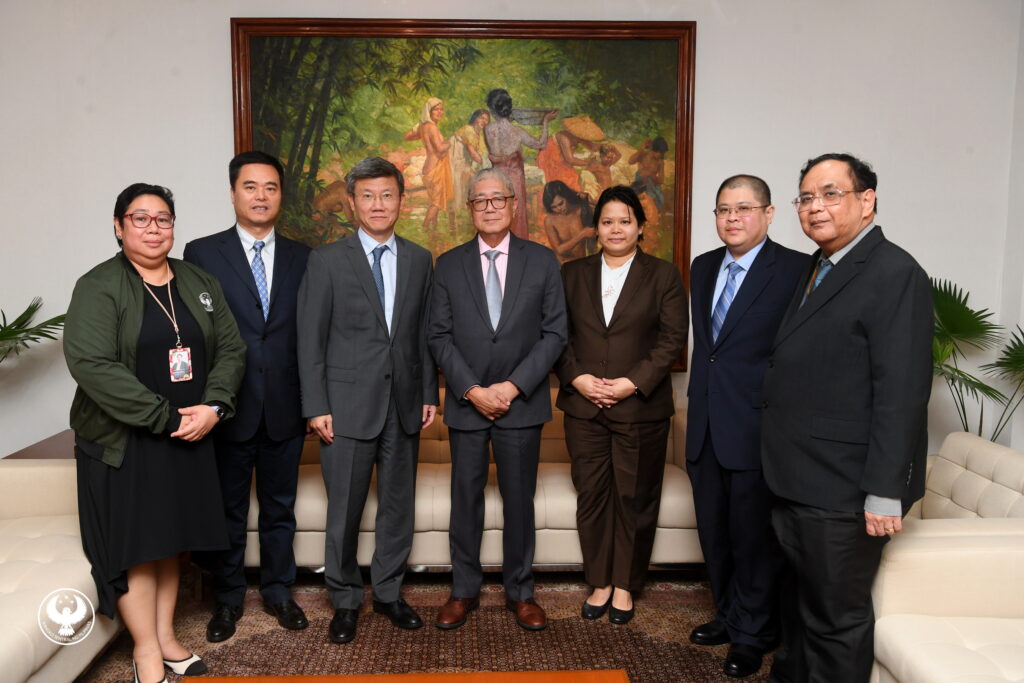
Image: MDV Edwards / Shutterstock.com
SINGAPORE, September 12, 2023 – The Philippine economy maintained its robust growth momentum in the first half of 2023, following a multi-decade high growth rate of 7.6 percent in 2022. Growth was supported by resilient domestic demand with a strong recovery in the labor market despite weaker external demand. Notwithstanding a widening current account deficit, external position remains sound with sufficient international reserve buffer and low external debt. Despite some moderation in 2023, inflation remained high, at a level above the 2–4 percent target, driven by buoyant demand.
This preliminary assessment was made by the ASEAN+3 Macroeconomic Research Office (AMRO) during its Annual Consultation Visit to the Philippines from August 29 – September 8, 2023.
The AMRO team was led by Group Head and Principal Economist Runchana Pongsaparn. AMRO Director Kouqing Li and Chief Economist Hoe Ee Khor participated in the policy meetings and also met with Bangko Sentral ng Pilipinas (BSP) Governor Eli M. Remolona, Jr., Deputy Governor Francisco G. Dakila, Jr., and Department of Finance Undersecretary Maria Edita Z. Tan. The discussions focused on the risks and challenges facing the Philippines, and policy options to sustain the growth momentum, manage elevated inflationary pressures, restore fiscal buffer, and address long-term structural issues.
Economic developments and outlook
“Philippines’ economic growth is projected to moderate to 5.9 percent in 2023 due to high base effects and weaker external demand, before edging up to 6.5 percent in 2024 as external demand recovers,” said Dr. Pongsaparn. “Meanwhile, domestic demand is expected to remain robust supported by continued improvement in labor market conditions, lower inflation, robust overseas remittances, and higher government infrastructure spending.”
Headline CPI inflation is projected to moderate to 5.5 percent in 2023 from 5.8 percent in 2022, and slow further to 3.8 percent in 2024. Despite some moderation, inflationary pressure will likely remain elevated as reflected in the high level of core inflation, due to a positive output gap and the second-round effects induced by increases in the minimum wages and expectations of persistently high inflation.
On the external front, a widening current account deficit was partly offset by net capital inflows. At the same time, external debt remained low and international reserve buffer was adequate. The banking sector has improved profitability, ample liquidity, and sufficient capital buffer. The fiscal position continues to improve in 2023, attributed to robust revenue collection and moderate spending.
Risk and vulnerabilities
The Philippine economic outlook is clouded by various risk factors and challenges. In the short term, the economy could be adversely affected by high inflation, especially due to local supply shocks in the food sector. An economic slowdown in major trading partners and volatility in the global financial market, along with tighter financial conditions, also pose risks. The long-term growth potential is largely affected by the scarring effects of the pandemic, the pace of infrastructure development, geopolitical risks, and the economic losses from natural disasters, which are being exacerbated by climate change.
Policy recommendations
The BSP tightened monetary policy aggressively to address rising inflation, in doing so, the policy interest rate was raised by a cumulative 425 bps between May 2022 and March 2023. The 2024 budget aims to continue to reduce the fiscal deficit, guided by the medium-term fiscal framework. The fiscal stance is assessed to be countercyclical under a positive output gap.
At the current juncture, tightened monetary policy and contractionary fiscal stance is an appropriate policy mix amid a positive output gap and persistent inflationary pressure. The “all-of-government approach” against inflation is welcomed as it addresses the supply side problems. Macroprudential tools can be used actively to address potential financial stability issues.
In the medium to long term, fiscal policy should balance between restoring fiscal buffer and supporting sustainable growth and development. Fiscal consolidation is supported by strong commitment and well-defined targets and measures, anchored by fiscal rules and discipline. On the financial system side, close coordination between regulators is crucial in identifying, monitoring and mitigating financial stability risks that might arise from non-financial corporates. Meanwhile, the authorities should continue to improve the liquidity management framework, develop the bond and repo markets, and continue to expand financial inclusion, to enhance the system’s resilience to shocks and promote market activities.
A comprehensive strategy is warranted to bolster the Philippines’ medium- to long-term economic growth potential. Overcoming the scarring effects of the pandemic mandates a sustained focus on upgrading and upskilling the workforce to embrace a more technology-driven economy. The implementation of policies and measures to attract investments, particularly foreign investments, and promote exports of both goods and services are the underpinnings of long-term economic development. Furthermore, the government can enhance the country’s competitiveness through infrastructure investment, digitalization, and developing a green economy.
On behalf of AMRO, the mission team would like to express their appreciation to the Philippine authorities and other counterparts for their kind cooperation, insightful discussions, as well as hospitality.
About AMRO
The ASEAN+3 Macroeconomic Research Office (AMRO) is an international organization established to contribute toward securing macroeconomic and financial resilience and stability of the ASEAN+3 region, comprising 10 members of the Association of Southeast Asian Nations (ASEAN) and China; Hong Kong, China; Japan; and Korea. AMRO’s mandate is to conduct macroeconomic surveillance, support regional financial arrangements, and provide technical assistance to the members. In addition, AMRO also serves as a regional knowledge hub and provides support to ASEAN+3 financial cooperation.

AMRO Director Kouqing Li and the AMRO team met with Governor Eli M. Remolona, Jr. and other senior officials from the Bangko Sentral ng Pilipinas.
